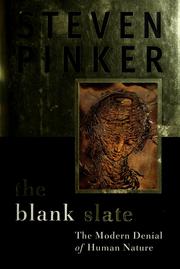Check nearby libraries
Buy this book

"In The Blank Slate, Steven Pinker explores the idea of human nature and its moral, emotional, and political colorings. He shows how many intellectuals have denied the existence of human nature by embracing three linked dogmas: the Blank Slate (the mind has no innate traits), the Noble Savage (people are born good and corrupted by society), and the Ghost in the Machine (each of us has a soul that makes choices free from biology).
Each dogma carries a moral burden, so their defenders have engaged in desperate tactics to discredit the scientists who are now challenging them.".
"Pinker injects calm and rationality into these debates by showing that equality, progress, responsibility, and purpose have nothing to fear from discoveries about a rich human nature. He disarms even the most menacing threats with clear thinking, common sense, and pertinent facts from science and history. Despite its popularity among intellectuals during much of the twentieth century, he argues, the doctrine of the Blank Slate may have done more harm than good.
It denies our common humanity and our individual preferences, replaces hardheaded analyses of social problems with feel-good slogans, and distorts our understanding of government, violence, parenting, and the arts.".
"Pinker shows that an acknowledgement of human nature that is grounded in science and common sense, far from being dangerous, can complement insights about the human condition made by millennia of artists and philosophers. All this is done in the style that earned his previous books many prizes and worldwide acclaim: wit, lucidity, and insight into matters great and small."--BOOK JACKET.
Check nearby libraries
Buy this book

Previews available in: English
Subjects
Developmental psychology, Nature and nurture, Sociology, Nonfiction, History, Long Now Manual for Civilization, Hérédité et milieu, Psychobiologie, Être humain, Inné et acquis, Erfelijkheid en omgeving, Sociale evolutie, Anthropologie philosophique, Menselijke natuur, Denial (Psychology), Behavioral Genetics, Social Behavior, Environment, Human Characteristics, Characters and characteristics, Philosophie de l'hommePeople
Noam Chomsky (1928-)Showing 10 featured editions. View all 10 editions?
| Edition | Availability |
|---|---|
|
01
The Blank Slate
2008, Penguin Group USA, Inc.
Electronic resource
in English
1429514485 9781429514484
|
zzzz
Libraries near you:
WorldCat
|
| 02 |
eeee
Libraries near you:
WorldCat
|
|
03
The Blank Slate: The Modern Denial of Human Nature
August 26, 2003, Penguin (Non-Classics)
in English
0142003344 9780142003343
|
zzzz
Libraries near you:
WorldCat
|
|
04
The Blank Slate: the Modern Denial of Human Nature
January 1, 2002, Viking
Paperback
in English
0965491730 9780965491730
|
eeee
Libraries near you:
WorldCat
|
| 05 |
eeee
Libraries near you:
WorldCat
|
| 06 |
aaaa
Libraries near you:
WorldCat
|
|
07
The Blank Slate: The Modern Denial of Human Nature
September 26, 2002, Viking Adult
Hardcover
in English
0670031518 9780670031511
|
zzzz
Libraries near you:
WorldCat
|
|
08
The blank slate: the modern denial of human nature
2002, Penguin
in English
0142003344 9780142003343
|
eeee
Libraries near you:
WorldCat
|
|
09
The Blank Slate : The Modern Denial of Human Nature
2002, Viking Press
in English
014188584X 9780141885841
|
zzzz
Libraries near you:
WorldCat
|
| 10 |
zzzz
Libraries near you:
WorldCat
|
Book Details
Edition Notes
Classifications
The Physical Object
ID Numbers
Work Description
In The Blank Slate, Steven Pinker, one of the world's leading experts on language and the mind, explores the idea of human nature and its moral, emotional, and political colorings. With characteristic wit, lucidity, and insight, Pinker argues that the dogma that the mind has no innate traits-a doctrine held by many intellectuals during the past century-denies our common humanity and our individual preferences, replaces objective analyses of social problems with feel-good slogans, and distorts our understanding of politics, violence, parenting, and the arts. Injecting calm and rationality into debates that are notorious for ax-grinding and mud-slinging, Pinker shows the importance of an honest acknowledgment of human nature based on science and common sense.
Community Reviews (0)
Feedback?| November 11, 2022 | Edited by MARC Bot | import existing book |
| October 21, 2021 | Edited by ImportBot | import existing book |
| September 13, 2021 | Edited by Jenner | Merge works |
| August 1, 2020 | Edited by ImportBot | import existing book |
| December 8, 2009 | Created by ImportBot | add works page |





















![Cover of: [cat's cradle] Cover of: [cat's cradle]](http://covers.openlibrary.org/b/id/6381187-S.jpg)
